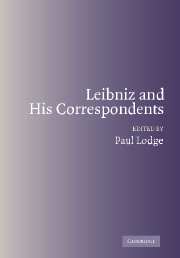Book contents
- Frontmatter
- Contents
- Contributors
- Abbreviations
- Acknowledgments
- 1 Introduction
- 2 Leibniz and His Master: The Correspondence with Jakob Thomasius
- 3 A Philosophical Apprenticeship: Leibniz's Correspondence with the Secretary of the Royal Society, Henry Oldenburg
- 4 The Leibniz–Foucher Alliance and Its Philosophical Bases
- 5 Leibniz to Arnauld: Platonic and Aristotelian Themes on Matter and Corporeal Substance
- 6 Leibniz and Fardella: Body, Substance, and Idealism
- 7 Leibniz's Exchange with the Jesuits in China
- 8 Leibniz's Close Encounter with Cartesianism in the Correspondence with De Volder
- 9 “All the time and everywhere everything's the same as here”: The Principle of Uniformity in the Correspondence Between Leibniz and Lady Masham
- 10 Idealism Declined: Leibniz and Christian Wolff
- 11 On Substance and Relations in Leibniz's Correspondence with Des Bosses
- 12 “[…] et je serai tousjours la même pour vous”: Personal, Political, and Philosophical Dimensions of the Leibniz–Caroline Correspondence
- References
- Index
10 - Idealism Declined: Leibniz and Christian Wolff
Published online by Cambridge University Press: 02 September 2009
- Frontmatter
- Contents
- Contributors
- Abbreviations
- Acknowledgments
- 1 Introduction
- 2 Leibniz and His Master: The Correspondence with Jakob Thomasius
- 3 A Philosophical Apprenticeship: Leibniz's Correspondence with the Secretary of the Royal Society, Henry Oldenburg
- 4 The Leibniz–Foucher Alliance and Its Philosophical Bases
- 5 Leibniz to Arnauld: Platonic and Aristotelian Themes on Matter and Corporeal Substance
- 6 Leibniz and Fardella: Body, Substance, and Idealism
- 7 Leibniz's Exchange with the Jesuits in China
- 8 Leibniz's Close Encounter with Cartesianism in the Correspondence with De Volder
- 9 “All the time and everywhere everything's the same as here”: The Principle of Uniformity in the Correspondence Between Leibniz and Lady Masham
- 10 Idealism Declined: Leibniz and Christian Wolff
- 11 On Substance and Relations in Leibniz's Correspondence with Des Bosses
- 12 “[…] et je serai tousjours la même pour vous”: Personal, Political, and Philosophical Dimensions of the Leibniz–Caroline Correspondence
- References
- Index
Summary
Christian Wolff has often been seen as Leibniz's direct philosophical descendant. Superficially, there is something to be said for this. On a personal level, Leibniz went out of his way to assist his younger compatriot in securing an academic position and looked favorably on Wolff's contributions to the advancement of learning in Germany. On a philosophical level, there is no doubt that Wolff drew heavily on the resources of Leibniz's philosophy and laid out one path along which that philosophy might be developed. Still, it is easy to exaggerate the depth of the relationship between the two men. Despite the extensive correspondence they carried on for over decade (1704–16), Leibniz and Wolff each were not intimates. As Leibniz viewed the matter near the end of his life, Wolff was a bright and enterprising young academic, who had shown an interest in Leibniz's views and was now principally engaged in teaching mathematics. Wolff was no more eager to claim a close kinship with Leibniz. As a bright and enterprising young academic, he above all wished to secure his reputation as the founder of a philosophical system that was indisputably his own. The last thing he wanted was to be known as a mere epigone of Leibniz.
History, though, does not always respect the wishes of its agents, nor historiography the facts of history. Despite what Leibniz and Wolff each may have thought of their relationship, it has come to loom large in the subsequent telling of the history of philosophy.
- Type
- Chapter
- Information
- Leibniz and his Correspondents , pp. 214 - 237Publisher: Cambridge University PressPrint publication year: 2004
- 3
- Cited by



